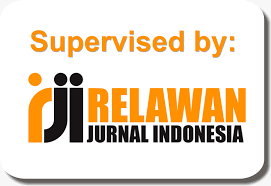THE CORRELATION BETWEEN STUDENTS’ HABIT IN WATCHING ENGLISH MOVIE AND VOCABULARY MASTERY
DOI:
https://doi.org/10.52333/djoee.v4i1.77Keywords:
correlation, English movie, vocabulary mastery.Abstract
Watching English movie is to enrich students’ knowledge especially vocabulary. The objectives were to find out whether or not there was a significant correlation between habit in watching English movie and vocabulary mastery of the tenth grade students. It was also found out how much habit in watching English movie contributes toward vocabulary mastery of the tenth grade students at MAN 2 Palembang. This study involved 77 students as the sample chosen by using purposive sampling. The data were collected by using habit in watching English movie questionnaire and vocabulary mastery test. It was found that there was a significant correlation between habit in watching English movie and vocabulary mastery of the tenth grade students at MAN 2 Palembang since the p-value (0.024) was lower than 0.05. It can be stated that the null hypothesis (Ho) was rejected and the alternative hypothesis (Ha) was accepted. Then, the r value was 0.836 that showed high correlation between students’ habit in watching English movie and vocabulary mastery. It is assumed that watching English movie gave contribution to vocabulary mastery as much as 41.9 %. In conclusion, there is a positive correlation between students’ habit in watching English movie and vocabulary mastery.
References
Barmawi. (2016). The correlation between students habit in watching English movie on personal computer and their vocabulary mastery (Unpublished undergraduate thesis), IAIN Antasari Banjarmasin, Banjarmasin.
Champoux, J. E. (2007). Film as a teaching resource. New Mexico: The University of New Mexico.
Dhamarullah, I. A. (2015). The relationship between movie watching activity and listening skill. (Unpublished undergraduate thesis), UIN Syarif hidayatullah Jakarta, Jakarta.
Harmon, J. M., Hendrick., & Wood, K. D. (2007). A new look at habits and the habit goal interface. New York: Duke university.
Khan, A. (2015). Using films in the ESL classroom to improve communication skills of non-native learners. International Journal of Language & Communication Disorders. 4 (1), 354-355.
Kusumarasdyati, L. (2004). Listening, viewing and Imagination : Movies in EFL classes. Paper presented at the second International Conference on Imagination and Education, Vancouver, Canada.
Joseph E. C. (2007). Film as a teaching resource. New Mexico: The University of New Mexico.
Liana. (2013). Teaching writing skill by using caricature picture in making analytical exposition to the elevent grade students of SMA Aisyiyah 1 Palembang.(Unpublished Undergraduate Thesis). University of Muhammadiyah Palembang, Palembang.
Manurung, J. E. (2021). Implementation of Kahoot online and Google Form towards students’ vocabulary comprehension enhancement. Didascein: Journal of English Education. 2(1), 26 – 31. Doi. http://dx.doi.org/10.52333%2Fd.v2i1
Pratiwi, A. (2016). The effect of quick on the draw strategy on the students’ ability at writing news item text (Unpublished Thesis State Islamic) Universitas Sumatera Utara, Sumatera Utara.
Putri, W. (2014). The Effect of applying English movie on the students’ achievement on writing recount text (Unpublished thesis), Universitas Negeri Medan, Medan.
Ramadayanti, S. (2017). The correlation between students’ habit in watching English movie and their vocabulary mastery (Unpublished thesis) UIN Medan, Sumatera Utara.
Renandya, W. A., & Richard, J. C. (2002). Methodology in language teaching. New York: Cambridge University Press.
Setiawan, B. (2010). Improving the students’ vocabulary mastery through direct instruction (Unpublished thesis). Universitas Negeri Surakarta, Surakarta.
Schmit, N. (2000). Vocabulary in Language Teaching. Cambridge: Cambridge University Press.
Surya, D.(2013). Improving students’ English vocabulary through cluster technique. (Unpublished thesis). UIN Syarif Hidayatullah, Jakarta.
Syafi’i, A. (2013). Correlation between student interest in watching English movie and vocabulary mastery (Unpublished thesis), IAIN Salatiga, Jawa Tengah.
Downloads
Published
How to Cite
Issue
Section
License
Copyright (c) 2023 Rizky Azhar Azhar, Gaya Tridinanti

This work is licensed under a Creative Commons Attribution-NonCommercial-ShareAlike 4.0 International License.







